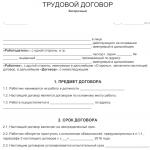Property rights are guaranteed to all citizens. Legislation regulates this area, and the state controls to ensure that there are no violations of people’s interests. But disputes often occur when citizens prove the possibility of using and disposing of property. A sample statement of claim for recognition of ownership rights will help to formalize it correctly.
There are grounds for bringing forward claims for recognition of property rights:
- Inconsistency of title documents with the norms of the law;
- The seller of the property that was sold under an ordinary contract has died or disappeared;
- There are no title papers for property that has been owned for several years;
- Unauthorized construction, for example, the land was acquired by the plaintiff from the cooperative without standard formalities and registration;
- Recognition of ownership in a new home.
Often property is inherited, but it may not be registered in Rosreestr. Because of this, it will not be possible to register inherited property. Then you need to go to court. Ownership rights by inheritance are confirmed by a certificate.
What does the decision depend on?
Court cases related to the recognition of rights to real estate are complex. It will not be possible to resolve them quickly, since meetings are postponed several times due to various circumstances. To speed up the process and ensure a positive decision, the plaintiff needs to prepare evidence that cannot be refuted.
A statement of claim for ownership is provided along with the documents. It is necessary to first obtain certificates, extracts and other papers provided by the justice authorities and the Bureau of Technical Inventory. The court sometimes requires additional documents if they are needed to consider the case.
Long-term ownership of real estate plays a huge role. But this should be confirmed by documents, and witnesses should be called. The decision is determined by a receipt for the maintenance of the facility, payment of utilities, and repairs. When the plaintiff is a legal entity, agreements are needed with service providers related to the ownership of the disputed object.
Statute of limitations
It is necessary to take into account the statute of limitations for purchasing real estate. If it is an apartment, house, land, then the period is 15 years. This rule means that if the person who filed the application has owned the property for over 15 years and legally maintained it, then the decision will most likely be in his favor. It is often necessary to file a claim for recognition of ownership of a garage.
If the statute of limitations has expired, but repair work has not been carried out, the court will make a negative decision. A statement of claim is required to recognize ownership rights. It is drawn up according to legal standards. Recognition of property rights by statute of limitations is carried out by the court.
A claim for recognition of ownership rights should be submitted with evidence of:
- Grounds of rights;
- Written information from witnesses;
- Photo and video materials.
Thanks to the presence of each legal document, it will be possible to consider the case in more detail. If papers are lost, they must be restored immediately, since many documents cannot be obtained in one day.

The law provides for a form of claim. It is compiled in writing. It should contain:
- Name of the court;
- Information about the plaintiff;
- Information about the defendant;
- Type of violation of rights;
- Circumstances serving as the basis and evidence;
- Cost of claim;
- Data on compliance with pre-trial order;
- List of documents.
Forms are provided in courts and law firms. It is necessary to attach extracts from the house register and archival information. You will also need:
- Copies of the application for all defendants and other persons;
- Paper confirming payment of state duty;
- Power of attorney;
- Evidence of claims;
- Confirmation of the implementation of the pre-trial order.
It is necessary to provide as much information as possible about the recognition of ownership of land or housing. The application is written in 3 copies: 2 of them are submitted to the court, and the last one remains with the applicant. It is submitted to the district court at the location of the facility. If a person lives in one city, and the property is located in another, then send the application by mail. It just needs to be certified by a notary.
Based on the legislation, there is an absentee review of such cases. Not the plaintiff, but his representative may be present. But it's better to be in person. Applicants are adults. Until the age of 18, interests are protected by a representative. An example of a statement of claim will help you draw it up correctly.
Name of the court
Plaintiff: Full name
Defendant: Full name
Claim price: ___
Statement of claim
about ownership of an apartment
As a result (purchase and sale, inheritance, etc.) I became the owner of an apartment, which is located at ____________ (defendant).
Ownership is evidenced by _______ (document data).
It was not possible to resolve the issue of determining property rights in pre-trial proceedings (indicate the reasons).
There are no claimants to my property. I have owned it since__(date), pay utility bills, and carry out repairs.
- Recognize the ownership of the housing located at the address ____ for ______ (full name of the plaintiff).
List of attached documents:
- A copy of the application;
- Payment of state duty;
- Proof of purchase;
- Fact of home ownership;
- A copy of the technical passport;
- Other evidence.
Date "__"______ ___ Signature__________
Before submitting the application, the state fee is paid. This can be done at any bank or via the Internet.
Description of the dispute
The dispute has a descriptive and motivational part. There are no rules for the sequence of presentation of information. After reading the claim, the judge must understand what the plaintiff is seeking. Therefore, it is important to make a description of the dispute - the property over which the conflict arose. The subject of the dispute indicates the characteristics that distinguish the property from another. This may be information from the cadastre and address. The vehicle requires information from the registration certificate. Photographs are boring for movable property.
Not everyone is able to clearly describe the situation. But this can be done on the basis of legal norms. The plaintiff must identify the grounds and laws that allow the right to be restored.
The pleading part includes demands. This is a request for proof of ownership. Requirements can be property or non-property. Property claims require setting the price of the claim (Article 91 of the Code of Civil Procedure of the Russian Federation). If the case concerns real estate, then to establish this indicator, the inventory value is measured, and otherwise, the characteristics specified in the insurance contract.
Property disputes are considered by arbitration courts and justice institutions. Objects can be real estate registered in Rosreestr. If during the course of the case it is determined that the object is not registered, then it will be recognized as ownerless. Then the state will be the owner, and the rights to it will be recognized as unfounded.
The evidence that is attached to the claim must be produced in a legal manner. This also applies to witnesses. False testimony entails liability, which is enshrined in the legislation of the Russian Federation.

The owner has 3 powers regarding his property:
- Possession – property belongs to its owner. In addition to the owner, the owner is other persons, for example, under a lease agreement.
- Use – property can be used for different purposes at the discretion of the owner. It exists on the basis of the right of ownership, which is also the case with other persons, which is permitted by the owner.
- Order. The owner can donate, sell, or rent out his property. The owner or other person has this right. The property can be used at will, without violating the rights of other persons and the rules of the law.
But with rights, the owner also has responsibilities:
- Property maintenance;
- Liability for damage.
The Civil Code of the Russian Federation specifies several types of owners:
- Citizens and individuals;
- Organizations;
- State;
- Foreigners;
- States.
Property rights are established by law. Property is private when it belongs to citizens, private individuals. There is property of legal entities and organizations that can use it to solve problems specified in the constituent documentation. Property may be owned by the state or municipality, which is recorded in documents. Recognition of this right is a mandatory procedure in order to be able to freely dispose of property.
There are cases when only a statement of claim for ownership of an apartment will allow the owner to legally secure his rights to this housing. Namely, the right to own, use and dispose of residential premises. From the point of view of the law, the entire scope of such rights in relation to the apartment can be used by the one for whom the ownership right is registered in Rosreestr. That is, official confirmation is necessary - state registration of real estate. And a positive court decision made on such a claim will become the basis for making an entry in the Unified State Register of Rights.
Ownership of an apartment arises during privatization, as a result of participation in shared construction, concluding sales and purchase agreements, etc. For such a claim, there must be a dispute about the law. With government authorities, with other persons. In some cases, a different method of protecting rights will be required. For example, handling , . It all depends on the specific circumstances of the case.
Example of a statement of claim
To the Akhtubinsky City Court
Astrakhan region
Akhtubinsk, st. Chernyshevsky,
14, apt. 42
tel. 2235435663,
Akhtubinsk
address: 416510, Astrakhan region, Akhtubinsky district,
Akhtubinsk, st. Lenina, 82
Since January 1991, I have been living in one-room apartment No. 42, located at the address: Akhtubinsk, st. Chernyshevsky, house 14, total area 41 sq.m., living area - 29 sq.m. In March 1993, the said apartment was transferred to my ownership by order of the Regional Potrebsoyuz in the manner of privatization. However, I cannot register ownership of the said apartment. Due to the fact that the BTI branch does not have an inventory file for the apartment (letter No. 17462 dated October 20, 2019).
In accordance with Art. 12 of the Civil Code of the Russian Federation, one of the ways to protect a violated right is recognition of the right. According to Art. 217 of the Civil Code of the Russian Federation, property in state or municipal ownership can be transferred to the ownership of citizens in the manner prescribed by the laws on privatization. By virtue of Art. 2 of the Law of the Russian Federation dated July 4, 1991 No. 1541-1 “On the privatization of housing stock in the Russian Federation,” citizens of the Russian Federation have the right to purchase residential premises. At the time of the emergence of ownership of the apartment, Art. 6 of the above Law as amended, according to which the transfer of property into the ownership of citizens was carried out, inter alia, by the institution into whose operational management the housing stock was transferred. In my case, Regional Potrebsoyuz had the right to transfer ownership of the apartment to me, which is confirmed by a copy of the registration certificate BTI 3 M132.
I have been registered in this apartment since 1991, I own it as the owner, pay utility bills and bear the burden of its maintenance. I have no information that other persons are applying for this apartment.
Based on the above, guided by art. 12, 217, 218 Civil Code of the Russian Federation, 131-132 Civil Procedure Code of the Russian Federation,
- Recognize ownership of apartment No. 42, located at the address: Akhtubinsk, st. Chernyshevsky, house 14 behind Khvorostova Marina Aleksandrovna.
Application:
- A copy of the statement of claim;
- Receipt for payment of state duty;
- A copy of the BTI registration certificate for the apartment;
- Receipts for payment of utility bills;
- Extract from home book.
11.23.2020 Khvorostova M.A.
How to draw up a statement of claim for ownership of an apartment
Correctly drawing up an application and providing available evidence to recognize ownership rights will significantly reduce the time it takes to consider it in court. And, therefore, speed up the proper registration of property rights.
The plaintiff is the person who directly owns the apartment, or any other person whose rights to such property are disputed. There may be several plaintiffs when they all have the basis for the emergence of common property. The defendant can be a conditional one (a government body that does not recognize the claimant's right of ownership). So is the person who claims his rights to the disputed apartment. You can invite the management of Rosreestr.
Ownership is confirmed by various documents. Purchase and sale agreements that were not registered in a timely manner (for example, the seller died, there are no heirs). Registration certificates of the BTI (according to the previously effective legislation, it was the specified body that formalized the fact of privatization). The plaintiff can attach receipts for payment of utility bills, certificates of registration in the apartment, technical documentation of the BTI.
The price of the claim is determined based on the inventory value, which can be found out by contacting the BTI.
Filing a claim for the rights to an apartment in court
The statement of claim is filed with the district court at the location of the apartment. If the amount to be paid is significant for the plaintiff, simultaneously with the statement of claim, you can file, or (documenting the existence of grounds for this).
After accepting the claim, the court will help to correctly determine the legal basis of the claim. Although, of course, the plaintiff must figure it out himself. Why does he have ownership rights to the apartment, how to protect it. To do this, the interested party can invite a lawyer. The site's on-duty lawyer can also give general recommendations, taking into account the nuances of the case.
The court considers a statement of claim for ownership of an apartment according to general principles.
The claim for recognition of a citizen's property rights is quite common and is often used in practice. The procedure for submitting this document and the specifics of filling it out are determined by procedural legislation.
About the concept
- this is a special document with the help of which a petition is sent to the court to assign a citizen the rights to own and use a specific thing. A citizen who applies to the court with this request already has a thing in his possession that needs to be legitimized.
Dear readers! The article talks about typical ways to resolve legal issues, but each case is individual. If you want to know how solve exactly your problem- contact a consultant:
APPLICATIONS AND CALLS ARE ACCEPTED 24/7 and 7 days a week.
It's fast and FOR FREE!
Which court should I go to?
To determine the court to which you need to file your application, you must use the rules of jurisdiction. Thus, the general rule for filing a claim is at the place of residence of the defendant. However, in the case when the issue of appropriation of the right to real estate is being decided, it is necessary to submit an application at its location.
The choice of district or magistrate court depends on the value of the claim:
- if the amount exceeds fifty thousand, then the application is submitted to district court;
- if it does not exceed, then in world.
How to file a claim
The main regulatory document regulating the procedure for filling out a statement of claim is the Civil Procedure Code. The form and examples of a ready-made claim are available on the judicial resources of any region of Russia.
In order for the claim to be competent from a legal point of view, it is necessary to determine the parties, as well as the substance of your petition. A claim for recognition of property rights has its own characteristics and features that must be taken into account when writing it.
Parties to the case
As in any other application to the judicial authorities, there are two parties to this claim, who have a set of rights and obligations enshrined in the procedural legislation of the Russian Federation:
- Plaintiff. This is a citizen or legal entity who asks the court to assign a specific right to him.
- Defendant. The defendant in this case can be any person who either interferes with the plaintiff’s disposal of his rights or simply does not recognize any legal rights for him.
Description of disputes and arguments
How to file a claim for recognition of ownership rights
In order to file an application with the court, it is necessary to resolve the issue of jurisdiction of the case. It refers to the choice of a specific judicial body to which to apply. As a general rule, such a petition is filed at the place where the defendant in this case is registered. If the thing is real estate, you need to apply to the court in the region in which the real estate is located.
For real estate
Claims for an apartment, garage and other real estate are filed at their location. As a rule, disputes over this kind of thing can arise due to the loss of documents confirming the right to them. In this case, the court must provide any evidence demonstrating the legality of possession and the existence of grounds for recognition of ownership. Moreover, in the statement of claim it is necessary to indicate the exact location of the property.
Due to acquisitive prescription, it is also possible to recognize the right of ownership:
- To do this, the real estate must be owned for more than 15 years. Such possession must be obvious, open and not contrary to the norms of Russian legislation. Moreover, the general statute of limitations for this category of disputes is three years.
- With the help of acquisitive prescription, you can acquire ownership not only of property recognized as immovable, but also of movable things. This can be done, for example, by registering missing documents for a car. This is necessary in cases where the inheritance was actually accepted and in other similar situations.
In order of succession
Situations often arise when you need to receive an item due by inheritance, but the deadline for its acceptance has been missed and a certificate confirming the right has not been issued by a notary. In this situation, you can use a claim for recognition of rights.
There is one main condition prior to filing an application - actual acceptance of the inheritance.
Such acceptance includes all those actions that allow us to say that the inheritance has come into possession:
- payment of debts of the testator;
- property protection;
- managing it, etc.
For unauthorized construction
Such a construction means any building or structure that was built outside the framework of the legislation of the Russian Federation. In order to acquire ownership of it, certain conditions must be met:
- the construction is safe from the point of view of building regulations;
- it does not violate the rights and interests of other citizens;
- erected in accordance with urban planning regulations.
If all these conditions are met, such a developer has the right to go to court at the location of this building. In such situations, the court, as a rule, sides with the applicant and legitimizes the construction.
For a plot of land
The right of ownership of real estate can be defended in court. The courts consider claims for the withdrawal of real estate from the use of third parties, the removal of obstacles to the ownership of their property and many other controversial issues.
Since real estate is always of significant value, defending your right to ownership is important for every owner. Going to court will require the collection of documentary evidence, sometimes testimony, and not just evidence establishing the rights.

There are often cases when the actual owner does not have documents and acts that allow him to undergo standard registration. When contacting Rosreestr, you must provide a document that legally substantiates the entry of information into the state register. If the package of documents submitted for registration for the property does not meet the standards, it will be returned to the applicant. You will have to go to court, the resulting positive resolution of the controversial issue will become the basis for registering the property.
Controversial issues arise in the following situations:
- property documents do not comply with standards and include dubious fragments;
- the seller who participated in the signing of the deed died before registration, there are no heirs or the location of the seller is unknown. This situation is not uncommon; in practice, the period between signing the purchase/sale agreement and subsequent registration is recommended to be reduced to a minimum. If, after signing the contract, the seller does not appear at Rosreestr, then ownership will have to be established through the court;
- in case of long-term residence (more than 15 years) without a certificate of ownership, the owner acquires the opportunity to defend his right in court. This situation arises in villages when the need for such documents arises extremely rarely: during inheritance or sale;
- illegal construction on the lands of a populated area. The scheme in this case is typical: the citizen was provided with a plot of settlement land from an organization or municipality. The plot was sold to a third party without proper registration in the real estate register. The home is being built and the time for its official registration has arrived. It is impossible to legalize construction without ownership of the land. The decision on the land is made by the court; development on the acquired land should be legalized;
- controversial issues regarding new buildings, claims against the developer or other interested parties. For example, the court is approached in a situation where registration is required, but there is confusion in the available documents, there are disputes regarding the footage of an apartment or house, or other issues that prevent registration;
- hereditary actions. Only property that has been officially registered can be bequeathed or disposed of by law. If the owner was at the stage of registration or privatization of his property, then it is considered that his will is reflected in his actions. Heirs have the right to continue issuing certificates of ownership. Sometimes property does not have the documents required for inheritance and applicants for inheritance have to independently go to court and obtain permission for further actions with the property.
This list is not exhaustive; additional needs for obtaining a court order may arise. Litigation regarding real estate and disputes between interested parties sometimes lasts for years, since the issue is extremely painful for most citizens.

A sample statement of claim can be downloaded on our website; we have presented to your attention the latest, most current version of a claim for recognition of property rights. According to the law, the issue of recognition of ownership of a house, apartment or plot of land can be raised as a result of one of the following legal actions:
- after the implementation of the privatization program;
- payment of share contributions for housing cooperatives;
- after the new building is put into operation during shared construction;
- when inheriting and obtaining a certificate of inheritance;
- by deed of gift from the property owner;
- under an exchange agreement or bill of sale.
The statement of claim must be supported by the applicant’s property. For land plots, apartments and houses, various packages of documents will be required to be submitted to Rosreestr. If the applicant was refused when contacting the registrar, then the reasons for such actions are indicated in the statement of claim. Disagreement is expressed in substantiated statements, which are confirmed by correlation with legislative provisions.
Consideration of the issue and making a positive decision will become the main document by which real estate can be registered in the Unified State Register of Real Estate. For example, if the seller of real estate signed a deed and received funds, but did not appear to register the transaction, then the buyer will have to file a claim for recognition of his rights in court. This step should be taken as early as possible, since after the claim is accepted, the property will be seized and the property will not be able to be sold again to an unscrupulous seller.
Since the claim is of a property nature, the amount of the state duty depends on the size of the inventory assessment of the property.
The statement of claim is considered by the district (city) court at the location of the property. The claim is accompanied by a package of documents confirming the applicant’s position, technical data on the facility, certificates and certificates. All information must be reliable and current at the time of applying to the court. The best solution to the problem would be to involve, since the success of the entire legal process largely depends on the literacy of the drafted claim.
Samples of statements of claim for recognition of ownership rights (forms, blanks)
How to recognize ownership of an apartment through the court
Grounds are required to file a claim(an application to the court for recognition of ownership of a land plot can be downloaded below in the article or at the end), according to which the statement of claim will be accepted for proceedings for further decision-making on the controversial issue. In this case, recognition of the right to a land plot is carried out:
- in case of illegal infringement, claims to property positions by third parties.
- Impossibility of protecting property rights in any way other than initiating an arbitration dispute.
Cases of violation of property rights include the following:
- ban on privatization by the municipality.
- Termination of the procedure for registering a property transaction.
- Disputes regarding the division of jointly acquired property after the divorce of spouses.
- Violation of inheritance rights by a successor on the part of other applicants from among the heirs or the notary conducting the inheritance case.
- Loss leading to the need to identify the status of the owner (you can find out more about such documentation).
- Self-capture registration.
- Separation of a share of the land plot from joint shared ownership, when obstacles are created by the board of the dacha cooperative or other co-owners.
- Release of a site from illegal seizure.
- Other situations requiring dispute resolution, including the establishment of the boundaries of the land plot, illegal use of the allotment by third parties. Also those described in our material about.
Arbitration consideration of the issue does not allow idle excitement of the process. To file a claim, conditions for a dispute to arise on the part of the counterparty are required.
In addition, premature contact with jurisdictional authorities is not allowed, bypassing the direct initiator of the problem aimed at harming the owner of the land plot. and about that.
This situation requires an attempt to build a dialogue with the culprit.
If the defendant is the administration or notary, as well as if they are competent to make a decision on the issue, a pre-trial procedure is carried out first. The same applies to the registration body and the board of SNT, DNT.
Without an official appeal to designated officials, which will need to be confirmed upon filing, the claim will be rejected.
A victim whose rights have been violated is required to contact the specified person with an official notification of claim. It sets out claims in the form of demands to restore violated property rights. You should also indicate your intention to go to court.
If, after contacting the initiator of the dispute, a negative official response was received, or the addressee of the claims ignored the requirements of the notifier, he has the right to go to court.
Step-by-step instructions for recognizing ownership of a land plot through the court
Conducting controversy in court

The trial is limited to the presentation of the circumstances of the case as stated by the counterparties. Accordingly, the information presented to the court may differ radically and throw the plaintiff off balance. To maintain the required state, you should rely only on facts supported by documents and certified by testimony.
Conducting a debate requires correct dialogue. In order not to violate its regulations, it is necessary to appeal to the court, and not react emotionally to the defendant’s statements, even if they turn out to be false.
The success of the procedure and the achievement of the goal by the plaintiff depend on how clearly the action plan is clearly developed. To do this, you should build the logic of the speech so that it appears convincing to the magistrate.
As a result of consideration of the dispute, the parties are invited to conclude a settlement agreement and make mutual concessions. If the result seems doubtful, it is advisable to consider such a proposal with all seriousness.
Since arbitration proceedings have many pitfalls, citizens prefer to contact a representative who acts in their interests. In this case, it should be taken into account that when carrying out a process against a municipality or other authorized body, a professional lawyer with experience in appearing in court will most likely participate in the debate on the opposite side.
The court's decision
Adopted on the basis of the norms of Part 1 of Art. 196 Code of Civil Procedure of the Russian Federation and Part 1 of Art. 168 Arbitration Procedure Code of the Russian Federation. It is drawn up in the form of an extract, which is handed over to the parties within three days. It comes into force 10 days after issuance. This period is given so that the losing party can challenge the arbitration award in a court of general jurisdiction of the second instance, which is the regional court. Therefore, the extract contains a motivational part (Article 170 of the Code of Civil Procedure of the Russian Federation).
Having adopted the decision, without filing an appeal, the parties will need to comply with it. If the resolution indicates the alienation of the site and the transfer of property to the winning party, it is required to vacate the territory.
If the decision is not executed, the winning party has the right to contact the bailiff service. The extract plays the role of a title document, which is submitted to the registration authority for
Peculiarities of the procedure for inheritance and allocation of joint property
Cases of recognition of ownership of a land plot by inheritance are associated with:
- missing the deadline for entering into inheritance;
- with the division of land between the heirs.
In the first case it is necessary to prove that the deadline was missed due to objective circumstances of which the plaintiff was a hostage. For example, he did not know and could not know about the death of the owner of the land plot. Or he was absent, unable to arrive to participate in the inheritance procedure.
When dividing the land plot, the plot is transferred to joint ownership. Provided that its dimensions allow for division, the heirs have the right to allocate shares, followed by land surveying and. Such actions are permissible even if one heir wishes, who invites the others to draw up an agreement, and in case of refusal, obtain an appropriate court decision (Clause 3 of Article 250 of the Civil Code of the Russian Federation).
Clause 3 art. 250 of the Civil Code of the Russian Federation Preemptive right to purchase
3. When selling a share in violation of the pre-emptive right, any other participant in shared ownership has the right, within three months, to demand in court the transfer of the rights and obligations of the buyer to him.
A similar procedure is required if a summer resident is separated from joint shared ownership. Obstacles placed in his direction by the board of the dacha cooperative or the general meeting require the initiation of civil proceedings. Since a significant number of persons are co-owners, notification of the allocation is sent to the board. The process is initiated only after a negative response from the founder or absence thereof.
A positive decision becomes the basis for re-registration of the dacha ownership in Rosreestr, which is accompanied by the receipt of a certificate of ownership and relatively autonomous disposal of the resulting property, excluding membership in a dacha owners’ cooperative.
Any obstacles that threaten the property right of the owner allow for the initiation of legal proceedings, including the filing of a claim for ownership of the land plot. Violated property rights are restored by court decision.




















